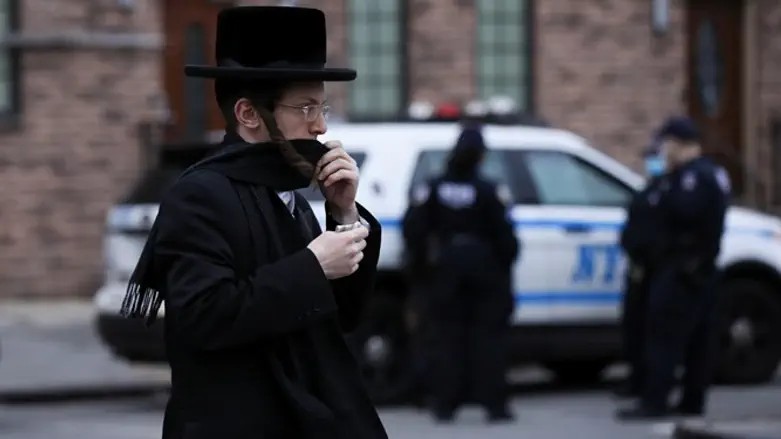
These remarks were recorded Erev Hoshana Rabba. The partial, somewhat paraphrased trranscribing is by Rochel Sylvetsky.
Two stories have unfolded in recent days: The first is that poliiticians and the press are targetting Jewish neighborhoods, something they would never do to any other ethnic or racial group. The second is the massive chilul Hashem in response, desecration of G-d's Name. We will focus on the second.
We must respond appropriately with the first, but we will talk about the second because we must remember that a chilul Hashem is not less condemnable because of provocation. Provocation does not mitigate or excuse a chilul Hashem.
There is no response except condemnation. This is self-condemnation (although I did not take part). We are all responsible for each other.
Why now? Response to chilul Hashem must be swift. Second, what has been happening to all of us is so deeply disturbing that it is difficult to focus and organize one's thoughts. But I will try. I will try to relate to what occurred these past two nights.
Let us briefly list what happened these past two night. Words are inadequate to depict the various manifestations of chilul Hashem. The violence was vile, shocking and depraved.
Perhaps some of those there were surprised and did not intend to be associated with the violence on Tuesday night.
But unfortunately, Wednesday night that excuse didn't exist, a repeat performance under the irresponsible so-called leadership.
Mob behavior masquerading as halakha. Invoking halakhic terms was brazen and inaccurate.
Hooliganism. Setting fires.
This is wild, lawless, uncivilized behavior. Period, Flouting public health measures in a hotspot in the middle of a pandemic? It is the antitthesis of the verse saying "what a wise, discerning people this great nation is."
Our behavior was benighted. This is leadership? Leadership that incites and makes use of foul language is not leadership.
If the event was highjacked, one was obligated to leave and disassociate from the chilul Hashem.
1. There is only one attitude justified when a Jew lives in the Diaspora.the Meshech Chochma comments on the Patriarch Jacob, Yaakov Avinu's request to be buried in Israel: Yaakov Avinu wanted to stress that the "patriarchs wanted to instill the longing for the Land of Israel in their offspring" and see themselves as strangers, temporary sojourners, in foreign lands.
That is the paradigm for a Jew who lives in galut (exile). No matter long it takes, no matter how many years elapse, a Jew is a stranger. "He must not see himself as a citizen."
This violence was the antithesis of Jewish existence in the Diaspora.
2. There is a way to protest and a way not to protest according to Torah laws.There was an edict in the Roman Empire forbidding adherence to basic halakhot. What did they do? The went and demonstrated at night - not arrogantly, not like hooligans - the Talmud says they only said "Are we not descendants of the same patriarch and matriarch, Isaac and Rebecca? Why are you singling us out?"
The brazenness, arrogance, defiance have been appalling.
3. The Ramban on the phrase Kedoshim Tiheyu ("You shall be holy" ) says, commenting on what Rashi cites from our Sages, that holiness involves abstinence. The Torah allows meat, wine, intimate relations, and a hedonist could find a loophole for indulgence and be a "naval birshut HaTorah" - a vile person under Torah auspices. That is the reason for this general command to practice moderation.
But the Ramban is teaching something even deeper: A dead animal is called a nevela (a word with the same root as naval, ed.) because the physical appearance of the animal remains, at least for a whle, but the inner vitality is missing.
In Psalms, King David says "A naval says n his heart, there is no G-d." Outwardly, he seems a man of faith, but inwardly, he is a nonbeliever.
Serving G-d is rooted in humility, submissiveness, really being a servant of G-d. Prayer is rooted in this idea. Joy is as well. Our Sages say a person who is arrogant, self-aggrandizing and accords himself respect is a deranged sinner.
When we protest violently using prayer as the excuse, our mssing the joy of the holiday as an excuse, we are "naval birshut Hatorah." Brazenness and arrogance distort all the prayer and all the joy of the holiday, all the experiences the Torah mandates. When this is used to cover mob violence, we understand the meaning of the phrase.
And another poiint: Protesting the governor's actions this way and remaining silent about the widespread non-observance of the regulations that caused the hotspot to come into being - only talking about ritual and not lifesaving public measures - that is a chilul Hashem. We cannot deny that the hotspots themselves in this resurgence of Covid is itself a chilul Hashem.
The atonement, teshuva, for chilul Hashem, Rabbeinu Yona tells us, is kiddush Hashem, the sanctification of G-d's Name.. May we merit a year of sanctifying Hashem's name, salvation, and consolation.
For the entire text, click here.
Rabbi Mayer E. Twersky (born October 17, 1960) is an Orthodox rabbi and one of the roshei yeshiva at the Rabbi Isaac Elchanan Theological Seminary (RIETS) of Yeshiva University. He holds the Leib Merkin Distinguished Professorial Chair in Talmud and Jewish Philosophy.[1] His popular lectures emphasize a combination of conceptual analyses and ethical imperatives.